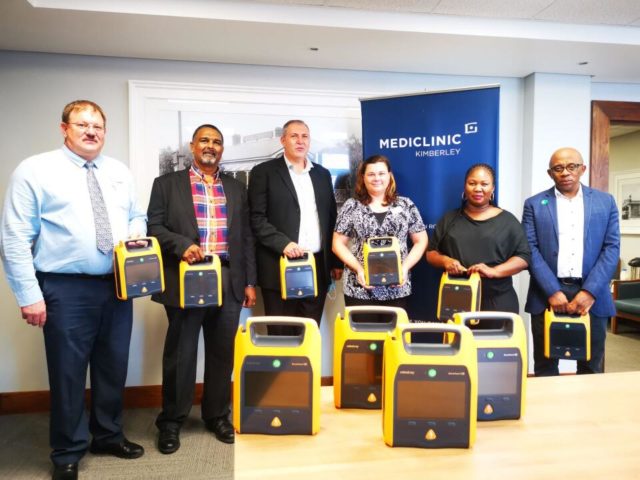Automated external defibrillators (AEDs) worth R1.5 million were donated by Mediclinic Southern Africa to the Northern Cape and Limpopo departments of Health on Monday.
AUTOMATED external defibrillators (AEDs) worth R1.5 million were donated by Mediclinic Southern Africa to the Northern Cape and Limpopo departments of Health on Monday.
The industry affairs executive for Mediclinic Southern Africa, Bob Govender, said 80 machines would be distributed to state facilities in the Northern Cape and 39 units in Limpopo.
“Doctors wanted to make use of other machines and it was donated to save lives.”
The machines are used to resuscitate patients suffering from cardiac arrest.
The Northern Cape MEC for Health, Maruping Lekwene, said the units would be distributed throughout the Province.
“This initiative is part of ongoing partnerships in place between provincial health departments and Mediclinic, which form a valuable connection between private and public sectors. The provision of these AEDs will offer immediate medical intervention to improve the possible outcome for such incidents. The units offer ideal solutions for locations such as schools, offices or sports stadium, where those with some training can quickly respond to an emergency. This donation will assist towards improving lives through the provision of quality health services.”
Govender added that they were partnering with the Department of Health to provide pro bono cataract surgeries for state patients at Mediclinic hospitals in Kimberley and Upington.
“We will cover all the costs while the Department of Health will cover the transport fees. We aim to carry out 100 cataract operations to coincide with National Eye Health Week in September. We have started with cleft palates, ear nose and throat and cataract surgeries across a few provinces. If all goes well with the roll-out we will expand the range of surgeries offered in the Northern Cape.”
He indicated that the only requirement was that patients had to possess a valid South African identity document.
“Assessments of patients will be conducted by the Department of Health.”
The acting head of the Department of Health, Riaan Strydom, stated that there was a backlog of about 252 cataract surgeries in the Frances Baard region.
“Elective surgeries took a big knock during the Covid-19 pandemic. The 100 surgeries will assist to cut down the backlog by about half, although the list for surgeries fluctuates daily. We aim to raise awareness about eye health.”








